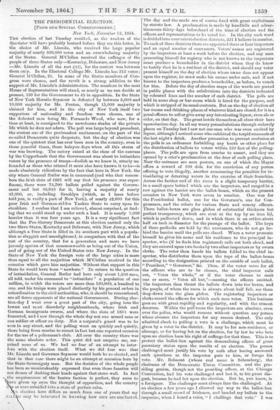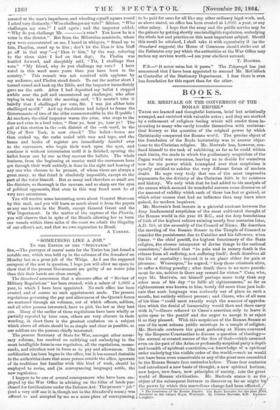THE PRESIDENTIAL ELECTION. [Frtoss ova SPECIAL CORRESPONDENT.]
a election here differs so much from one of yours that my real rs may be interested in knowing how ours are conducted.
The day and the mode are of course fixed with great explicitness by statute law. A proclamation is made by handbills and adver- tisements thirty days beforehand of the time of election and the officers and representatives to be voted for. In the city each ward is divided into convenient election districts, 221 I believe in number. To each of these districts there are appointed three or four inspectors and an equal number of canvassers. Voters' names are registered by the inspectors at least a week before the election, and any man presenting himself for registry who is not known to the inspectors must produce a householder in the district whom they do know to testify that he is a resident of the district, and should auy voter present himself on the day of election whose name does not appear upon the register, he must make his excuse under oath, and if not known to the inspectors produce a householder, as before, to vouch for him. Before the day of election maps of the wards are posted in public places with the subdivisions into the districts indicated by coloured lines and the number of each district. The polls are held in some shop or bar-room which is hired for the purpose, and which is stripped of its usual contents. But on the day of election all bar-rooms and drinking-places of whatever kind are closed, for it is a penal offence to sell or give away any intoxicating liquor, even ale or cider, on that day. The great hotels themselves all close their bars uponelection-day. In all my weary perambulations through unlovely places on Tuesday last I saw not one man who was even excited by liquor, although I noticed some who exhibited the torpid remnants of the last night's drink. Another precaution to prevent confusion at the polls is an ordinance forbidding any booth or other place for the distribution of ballots to voters within 150 feet of the polling- places. The polls are open from sunrise to sunset, and they are opened by a crier's proclamation at the door of each polling place. Near the entrance are seen posters, on one of which the Mayor offers a reward of 100. dols. for the conviction of any person. offering to vote illegally, another announcing the penalties for in- timidating or deterring voters in the exercise of their franchise. Across the farther end of the room is a slight temporary barrier, in a small space behind which are the inspectors, and ranged in a row against the barrier are the ballot-boxes, which on the present occasion in New York were seven in number. One was for the Presidential ballot, one for the Governor's, one for Con- gressmen, and the others for various State and county officers. These ballot-boxes are glass globes of substantial thickness but perfect transparency, which are shut at the top by an iron 14.1, which is padlocked down, and in which there is an orifice about half an inch in diameter for the passage of the ballot. The keys of these padlocks are held by the canvassers, who do not go be- hind the barrier until the polls are closed. When a voter presents himself he gives his name and his residence to the principal in- spector, who (if he finds him registered) calla out both aloud, and they are entered upon two books by two other inspectors or by sworn clerks. The voter then hands his ballots folded to the chief in- spector, who distributes them upon the tops of the ballot-boxes according to the designation printed on the outside of each ballot, "President," "Governor," &c. Then, if the voter votes for all the officers who are to be chosen, the chief inspector calls out, "Votes the whole," or if the voter chooses to omit one or more, " Votes all but,"—naming the officers omitted. 'Ile inspectors then thrust the ballots down into the boxes, and the people, of whom the room is always about half full, see them drop down into the glass globes. The registering inspectors or clerks record the officers for which each man votes. This business goes on with great rapidity and regularity, and with the utmost decorum. Within the poll:room the inspectors are absolute, even over the police, who would remove without question any person whose absence the inspectors for any reason desired. The only admitted check to polling is vote is a challenge, which must be given by a voter in the district. It may be for non-residence, or alienage, or for having bet on the election, for by law he who bets upon an election loam his right of suffrage for that time. This is to protect the ballot-box against the demoralizing effects of great pecuniary stakes upon the results of an election. The person challenged must justify his vote by oath after having answered such questions as the inspector puts to him, or forego his vote. Mr. Belmont (whose real name is Schomberg), the chairman of the Democratic Union Committee, and the pre- siding genius, though not the presiding officer, at the Chicago Convention, had his vote challenged and lost it, to his great dis- gust, because he had bet upon the election. But he, you know, is a foreigner. The challenger must always face the challenged. At an election a few years ago I elbowed my way to the ballot-box through a small crowd of Irishmen, and handed my ballots to the inspector, when I beard a voice, "I challinge that vote." I was
amazed at the man's impudence, and wheeling myself square round I asked very distinctly," Who challenges my vote?" Silence. "Who challenges my vote ?" I said again ; and the inspector added, "Why do you challenge Mr. 's vote? You know he is a voter in this district." But from the Hibernian semicircle, whose eyes were concentrated on me, I heard in whispers, "Stand up to him, Phaylim, stand up to him ; don't let the likes iv him bluff ye off in that way "—('‘ likes iv him," by the way, referring to the clean shirt I had on that day). So Phelim was hustled forward, and sheepishly said, "Yis, I challinge that vote." "My friend, why do you challenge my vote ? I have voted in this ward more years than you have been in the country." This remark was not received with applause by my audience, and Phelim stood dumb. To cut the matter short I turned round and took up the Bible, and the inspector immediately gave me the oath. After I had deposited my ballot 1 stopped awhile near the poll and encountered my challenger, who after trying in vain to shirk the meeting, said, "Ye mustn't take it hairdly that I challinged yer vote, Sir. I was jist afther bein challinged mesilf." And my forefathers had helped to frame the Governments of two of the older commonwealths in the Republic ! At sundown the chief inspector warns the crier, who steps to the door and cries in a loud voice," Hear ye, hear ye, hear ye ! The poll of this election in the —th district of the —th ward, in the City of New York, is now closed." The ballot - boxes are then corked up, the corks sealed with wax and tape, and the boxes and books of register are immediately handed over to the canvassers, who begin their work upon the spot, and continue it without intermission until it is finished, opening the ballot.boxes one by one as they canvass the ballots. The whole business, from the beginning at sunrise until the canvassers have got through their work entirely, is done in. the sight and hearing of any one who chooses to be present, of whom there are always a great many, so that fraud is absolutely impossible, except on the part of the voter himself. But so many and therefore so small are the districts, so thorough is the canvass, and so sharp are the eyes of political opponents, that even in this way fraud must be of very rare occurrence.
You will receive some interesting news about General Sherman by this mail, and you will learn as much about it from the papers as any one knows in the North, except General Grant and the War Department. In the matter of the capture of the Florida, you will observe that in spite of the Brazils allowing her to burn our vessels within three miles of the coast we admit the illegality of our officer's act, and that we owe reparation to Brazil.
A YANKEE.



































 Previous page
Previous page